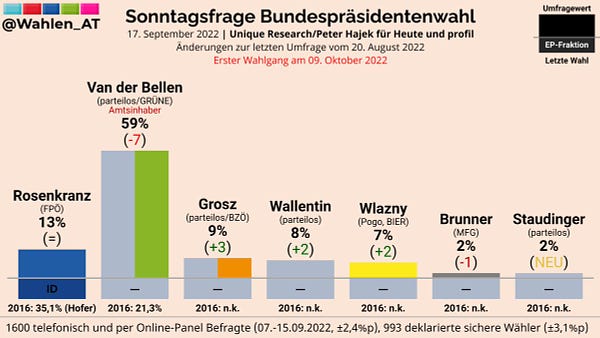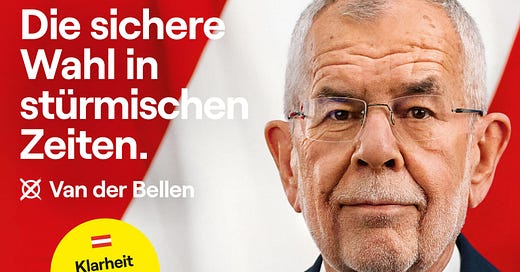The Invisible Campaign
Completely devoid of content and action, this year’s presidential election has been a disaster for democracy somewhat of its own making
Servus!
A couple of weeks ago, the first billboards promoting president Alexander Van der Bellen’s re-election campaign began appearing around my neighborhood. Cutting an avuncular, paternalistic figure, Van der Bellen stands atop a mountain with his hands on his hips and a sweater tied over his shoulders, staring off hopefully into the future. “With all my heart, Austria,” reads the slogan, evoking the safe and secure, folksy and non-threatening Heimat themes that stood Van der Bellen in such good stead when he unexpectedly won the last presidential contest in 2016.
It is a good thing that these billboards and placards began to sprout like mushrooms in the autumn rain, for without them, one would have had very little idea that a presidential election was about to take place on October 9. Though the vote is now about two weeks away and there are seven candidates including Van der Bellen running to be Austria’s head of state, the campaign has been incredibly low-key and rather processional, with very few public events, no television debates to date, and minimal media appearances from all candidates. This has been the invisible campaign—the presidential election that wasn’t.
The core issue is that Van der Bellen is an incumbent president who enjoys broad cross-party and popular support. As I have previously explained, there is a tradition in Austria of incumbent presidents winning a second term should they choose to stand again: from Adolf Schärf in 1963 to Heinz Fischer in 2010. Moreover, the People’s Party (ÖVP), Social Democratic Party (SPÖ), Greens, and NEOS have chosen not to stand candidates in this election, partly because they don’t have the funds to mount a challenge and partly because they don’t want to. All four parties have either explicitly or implicitly (in the case of the ÖVP) chosen to endorse Van der Bellen for re-elect.
In their absence, there is no serious challenger to Van der Bellen’s incumbency. His six opponents are a mélange of populists, clowns, and chancers looking to use the race in order to raise their public profile. The far-right Freedom Party (FPÖ) has nominated Walter Rosenkranz, the 60-year-old public ombudsman who previously served as an MP and head of the FPÖ’s regional party in the state of Lower Austria. His political hero is the nineteenth-century greater German nationalist and antisemite Julius Sylvester. The COVID-sceptic MFG Party has also put forward a candidate: Michael Brunner.
The rest are barely worth a mention but mention them we must. Gerald Grosz, a former columnist and far-right politician running on the slogan: “Make Austria Grosz again.” Heinrich Staudinger, an entrepreneur and anti-vaxxer campaigning on themes of poverty and the environment who once compared the COVID-sceptic demonstrations to Václav Havel’s resistance to communism. Tassilo Wallentin, who’s running as an independent after missing out on the FPÖ nomination. And finally, Dominik Wlazny, better known by his alias Marco Pogo, musician and leader of the joke Beer Party.


Completely devoid of content and action, this year’s presidential election has been a disaster for democracy somewhat of its own making: a steamroller of an incumbent, a political mainstream that has deserted the battlefield, and in its place, a smorgasbord of undesirable, largely populist and far-right opponents. The question is not whether Van der Bellen will defeat his myriad opponents and win re-election, but rather, if he will be able to do it in the first round or not. The most recent Heute/profil poll showed Van der Bellen’s lead shrinking but that he would capture 59 percent of the vote in the first round—enough to put him over the top. Should that transpire, Austria can in the aftermath do what it does best: Pretend this never happened, and move on.
Bis bald!
Thank you for being a subscriber to the Vienna Briefing. If you know someone else who might be interested in reading this newsletter, consider sharing it with them today.
The Vienna Briefing is a free newsletter. If you enjoy and would like to support my work, think about sending me a tip via PayPal.
Disaster Avoided?
The ÖVP suffered its worst result in the history of state elections in Tyrol when it won only 34.71 percent of the vote on Sunday: a near 10-point decline. The party, however, retained its leading role in Tyrolean politics and is set to enter into coalition negotiations this week. Its most likely partner is the SPÖ.
MP Under Suspicion
State prosecutors in Vienna believe the FPÖ MP Christian Hafenecker obtained falsified COVID-19 test certificates, an offence which could carry up to a one-year suspended sentence. Hafenecker denies the allegation and the presumption of innocence applies.
Austrian Defeat
Austria has been relegated to League B of UEFA’s Nations League competition. The national soccer team suffered defeats to France (0-2) and Croatia (1-3) in its final two group games, ensuring their demotion to the Nations League’s second tier.
The Vienna Briefing will return on October 12.




